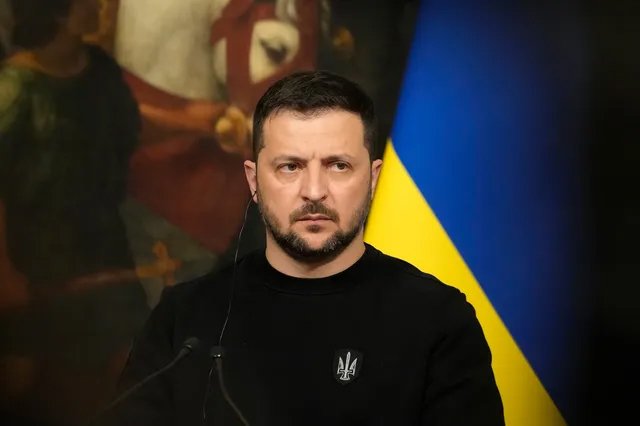WASHINGTON, Dec 13: Ukrainian President Volodymyr Zelenskyy told America his country was fighting for “our freedom and yours” as he made an impassioned plea on Tuesday for Congress to approve more assistance to fight Russia’s invasion.
But prospects for additional U.S. aid to Ukraine appeared seriously delayed, if not in grave doubt, despite his whirlwind diplomacy in Washington.
After hours of talks on Capitol Hill, Zelenskyy spent more hours at the White House meeting with President Joe Biden and his aides about a way forward. The U.S. has already provided Ukraine $111 billion since Russian President Vladimir Putin launched his grinding invasion more than 21 months ago, but Republicans are insisting on linking any more money to strict U.S.-Mexico border security changes that Democrats decry.
The White House is warning that if new money isn’t provided by year’s end it will have swift consequences for Ukraine’s capacity to hold its territory, let alone take back land captured by Russia.
People flee through dangerous conditions as they escape a grim life in Russia-controlled Ukraine
As Zelenskyy wrapped up his two-day visit to Washington, it was unclear if he had been able to shake up the political stalemate over aid –- though negotiations swiftly resumed at the Capitol and key Senate negotiators emerged saying they had made progress. He sought to make the case that supporting his country’s fight for its territorial integrity is about far more than Ukraine.
“For nearly two years we’ve been in a full scale war — the biggest since World War II, fighting for freedom,” Zelenskyy said. “No matter what Putin tries he hasn’t won any victories. Thanks to Ukraine’s success — success in defense — other European nations are safe from the Russian aggression.”
Biden similarly warned that failure by the United States to provide Ukraine further aid would embolden Russian President Vladimir Putin and others on the world stage.
“Putin is banking on the United States failing to deliver on Ukraine,” Biden said. “We must, we must, we must prove him wrong.”
Earlier, meeting with Zelenskyy in the Oval Office, Biden called on Congress “to do the right thing, to stand with Ukraine, and to stand up for freedom.” He added, “Congress needs to pass the supplemental funding for Ukraine before they break for the holiday recess, before they give Putin the greatest Christmas gift they could possibly give him.”
Zelenskyy made his own case in his private meetings with congressional leaders — that Ukrainian forces have fought fiercely to push back the Russian invasion with the help of American and other Western allies and it’s no time for Ukraine’s friends to step back.
“The fight we’re in is a fight for freedom,” Zelenskyy repeatedly said in the meetings on Capitol Hill, according to lawmakers.
Elsewhere, meanwhile, more than 130 senior lawmakers from across Europe signed a letter urging U.S. lawmakers to continue their support for Ukraine.
At the Capitol, flanked by Democratic Majority Leader Chuck Schumer and Republican Minority Leader Mitch McConnell, Zelenskyy entered a private meeting with senators with a public bipartisan show of support and to some applause. But more than an hour later few senators’ minds appeared changed.
Zelenskyy also visited House leaders, including a private meeting with new Speaker Mike Johnson, whose hard-right Republicans have been the most resistant to any deal. Johnson insisted afterward, “We do want to do the right thing here.”
Zelenskyy sought to impress on the senators that Ukraine could win the war against Russia, telling them he was drafting men in their 30s and 40s in a show of strength for the battle. In his trademark olive drab, he stood before a portrait of George Washington, history hanging behind him.
To the House Democrats, he showcased his country’s embrace of the West by pointing to the Christmas season, telling them it was the first year Ukraine would celebrate on Dec. 25 rather than the day Russians mark the holiday.
McConnell said Zelenskyy was “inspirational and determined” in the Senate meeting.
But Republican senators seemed unmoved from their position. Sen. Markwayne Mullin of Oklahoma said the emergency funding wouldn’t gain GOP support unless it includes “real, meaningful border reform.”
Biden pushed back that “history will judge harshly those who turned their backs on freedom’s cause.” The president quoted a Kremlin-aligned television host celebrating Republicans’ recent blocking of aid as a job “well done.”
“If you’re being celebrated by Russian propagandists, it might be time to rethink what you’re doing,” he said.
Biden has been calling for a $110 billion U.S. aid package for Ukraine, Israel and other national security needs.
He has expressed a willingness to engage with the Republicans as migrant crossings have hit record highs along the U.S.-Mexico border, but Democrats in his own party oppose proposals for expedited deportations and strict asylum standards as a return to Trump-era hostility toward migrants.
Homeland Secretary Alejandro Mayorkas met for nearly two hours at the Capitol to help with talks. Key Senate negotiators Republican Sen. James Lankford of Oklahoma and Democratic Sen. Kyrsten Sinema of Arizona both left saying they made progress.
Ahead of Zelenskyy’s high-stakes meetings, the White House pointed to newly declassified intelligence that shows Ukraine has inflicted heavy losses on Russia in recent fighting along the Avdiivka-Novopavlivka axis — including 13,000 casualties and over 220 combat vehicle losses. The Ukrainian holdout in the country’s partly-occupied east has been the center of some of the fiercest fighting in recent weeks.
U.S. intelligence officials have determined that the Russians think if they can achieve a military deadlock through the winter it will drain Western support for Ukraine and ultimately give Russia the advantage, despite the fact that Russians have sustained heavy losses and have been slowed by persistent shortages of trained personnel, munitions and equipment.
It’s Zelenskyy’s third visit to Washington since the war broke out in February 2022, including a quick trip just a few months ago as aid was being considered. His surprise arrival days before Christmas last December, his daring first wartime trip out of Ukraine, drew thunderous applause in Congress.
At the time, lawmakers sported the blue-and-yellow colors of Ukraine, and Zelenskyy delivered a speech that drew on the parallels to World War II as he thanked Americans for their support.
But 2023 brought a new power center of hard-right Republicans, many aligned with Donald Trump, the former president who is now the GOP front-runner in the 2024 race for the White House.
Republican Rep. Michael McCaul of Texas, the chairman of the House Foreign Affairs Committee, said Zelenskyy might be able to take on the stalemate by showing the stakes of potential Russian expansion toward NATO, and making his case on “moral clarity and why is Ukraine important.”
Zelenskyy kicked off the quick visit to Washington on Monday, warning in a speech at a defense university that Russia may be fighting in Ukraine but its “real target is freedom” in America and around the world. During his meeting with Biden, he also sought to assure Congress — and the American public — that Ukraine was worth the substantial cost to the United States.
“Ukraine can win,” said Zelenskyy. “People need to be confident that freedom is secure.”
Of the new $110 billion national security package, $61.4 billion would go toward Ukraine — with about half to the U.S. Defense Department to replenish weaponry it is supplying, and the other half for other military intelligence and defense support, humanitarian assistance and to help the Ukrainian government function with emergency responders, public works and other operations.
The package includes another nearly $14 billion for Israel as it fights Hamas and $14 billion for U.S. border security. Additional funds would go for national security needs in the Asia-Pacific region.
Biden also announced Tuesday that he had approved an additional $200 million military aid package for Ukraine. Including that latest package, the U.S. now has about $4.4 billion remaining in weapons it can provide from department stockpiles. (AP)












